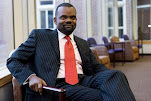 By George White
By George White As we enter the busiest traveling season of the year, one story has remained constant on the Internet and the evening news – the fear of and objections to TSA body scanners and pat-down searches in the nation’s airports.
As a civil libertarian, I appreciate the concerns of travelers and their allies. But at this historical moment, I’m unconvinced that civil liberties are the main thrust of the protests.
Black communities have been among the most policed and monitored groups in American history. We have been forced to live our lives out in the open, whether being groped and prodded on auction blocks or on city sidewalks as part of a “stop-and-frisk” regimen. Sometimes our right to move freely depended entirely on a White person’s determination that our “pass” was valid. At other times, that freedom could be curtailed by local, state, or federal law enforcement officials who suspected that legitimate political organizing was really a “front” for Social Justice conspiracy.
One of the interesting aspects of racial segregation was that White Supremacists consistently used concerns over “security” to justify their heinous crimes (lynching, anyone) or deprivations of freedom. Even the State of Louisiana in the infamous Plessy v. Ferguson case argued that its legal enshrinement of “Jim Crow” was a justifiable use of its “police powers.” Our history proves that racial profiling does not work and that it obscures more than it illuminates. Our present reveals that our city streets, bus terminals, and subway stations are sites of public humiliation, as some of us are strip searched or forced to lay face-down on the ground. These same spaces can become killing fields for people like Sean Bell or Oscar Grant. It has become common for most Americans to cheer on these efforts to “make our streets safer” or, at the very least, to walk or drive by without remark. Now, we’re supposed to be upset over body scanners at the airport…inside a building…where no one is taking down your name and address…planting evidence on you…or threatening to give you an “attitude adjustment” if you talk back?!
I agree that the security screens are invasive. I respect the voices of political conservatives like Bob Barr, one of the few Republicans who joined with the ACLU and regular citizens who organized against the USA PATRIOT ACT; regular citizens like me and other friends who founded the Greater Knoxville Civil Liberties Alliance in 2003. But the proposed alternatives frighten me too; racial profiling (you again?) and privatization (hunh?). And since the attacks-on-civil-liberties train left years ago, I am left to ponder if there is something else percolating in this anti-authoritarian brew.
I don’t travel much by air when I leave my new home in New York, but when I do I am always struck by the demographics of its airports: the travelers are overwhelmingly White and middle- or upper-class and the TSA agents are all working-class and, generally, people of color. I’m not saying that the dominant culture consciously has an aversion to being monitored by people of color, but it leads me to this thought: the fight over the body scanners and pat downs is a fight over the currency of normative (read: white) privilege.
Yes, this “crisis” is one of the ironic results of our national risk aversion. But remember, as Americans demanded to be made “perfectly safe” (an impossibility if there ever was one), the burden for this irrational stipulation fell overwhelmingly on the shoulders of people of color. Because the dominant culture wasn’t inconvenienced by these measures, there was very little resistance to such rash and draconian efforts. Fast forward to the twenty-first century.
Now that those who are accustomed to getting a free pass on these measures may have to experience the consequences of state surveillance, there is an increasing uproar about violating civil rights. Sure, the body scanners and pat-downs seem like unconstitutional violations of the 4th Amendment but so is everything else that has emerged from the silt of our radically raced and capitalist-driven “War on Terror.”
I’ll be happy to lend my outrage when everyone decides to 1) object to racial profiling; 2) remove the informants and agent provocateurs from neighborhoods and places of worship; 3) insist on the repeal of Arizona SB 1070; 4) free the Newburgh Four; 5) stop the warrantless wire-tapping and data mining; 6) protest the torture and continued imprisonment of detainees and “enemy combatants,” among other things. If, indeed, “freedom is not free,” as the conservative mantra goes, then neither is race privilege. Liberty and justice for the privileged just won’t cut it any more.

Admiring the time and effort you put into your blog and detailed information you offer!.. wide format laser printer
ReplyDelete